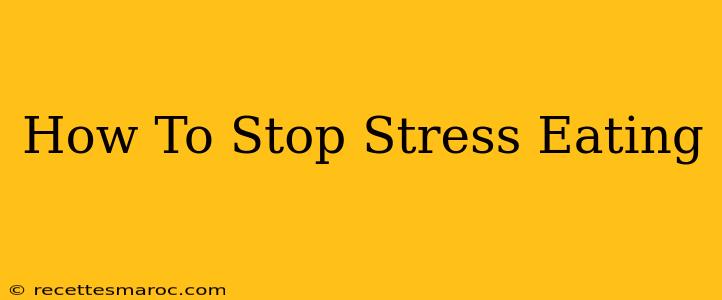Stress eating. We've all been there. That gnawing feeling in your stomach, not from hunger, but from anxiety, frustration, or boredom. Suddenly, that bag of chips or pint of ice cream seems like the only solution. But what if there was a better way? This guide provides practical strategies to help you break free from the cycle of stress eating and cultivate healthier coping mechanisms.
Understanding the Stress-Eating Connection
Before we dive into solutions, it's crucial to understand why we stress eat. It's not simply a lack of willpower; it's a complex interplay of factors:
- Emotional Regulation: Food, especially sugary or fatty foods, releases endorphins, providing a temporary sense of comfort and relief from stress. This immediate gratification reinforces the behavior.
- Habit and Routine: Stress eating can become a deeply ingrained habit, triggered by specific situations or emotions.
- Underlying Issues: Sometimes, stress eating masks deeper emotional issues like anxiety, depression, or loneliness. Addressing these underlying problems is key to long-term success.
Practical Strategies to Stop Stress Eating
Now that we understand the root causes, let's explore effective strategies to break the cycle:
1. Identify Your Triggers
The first step is awareness. Keep a food journal, noting what you eat, when you eat it, and how you're feeling. This helps pinpoint specific situations, emotions, or times of day that trigger your stress eating. Are you more likely to reach for comfort food after a long workday, during arguments, or when feeling lonely? Identifying these triggers is half the battle.
2. Develop Healthy Coping Mechanisms
Instead of turning to food, explore healthier ways to manage stress:
- Exercise: Physical activity releases endorphins, naturally boosting your mood and reducing stress. Even a short walk can make a difference.
- Mindfulness and Meditation: Practicing mindfulness helps you become more aware of your thoughts and feelings, allowing you to manage stress in the moment without resorting to food. Meditation apps can guide you through this process.
- Deep Breathing Exercises: Deep, slow breaths can calm your nervous system and reduce feelings of anxiety.
- Spend Time in Nature: Connecting with nature can be incredibly calming and restorative.
- Engage in Hobbies: Dedicate time to activities you enjoy, whether it's reading, painting, playing music, or spending time with loved ones.
3. Make Healthy Food Choices Available
Having healthy snacks readily available can make it easier to resist unhealthy cravings. Stock your pantry and fridge with fruits, vegetables, nuts, and yogurt – options that provide sustained energy and nourishment.
4. Practice Self-Compassion
Be kind to yourself. There will be setbacks. Don't beat yourself up over occasional slip-ups. Instead, learn from them and refocus on your goals. Remember that progress, not perfection, is key.
5. Seek Professional Help
If stress eating is significantly impacting your life, consider seeking professional help. A therapist or counselor can help you address underlying emotional issues and develop healthier coping strategies. They can also provide guidance and support throughout your journey.
Maintaining Long-Term Success
Breaking the cycle of stress eating is a journey, not a destination. Consistency and self-compassion are crucial. By implementing these strategies and actively working on your emotional well-being, you can cultivate a healthier relationship with food and manage stress effectively. Remember, you deserve to feel good, both physically and emotionally.

